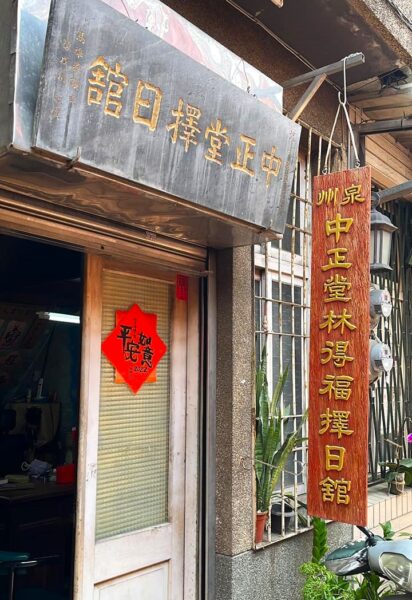Taiwanese people of Han Chinese descent tend to have three-syllable names, one syllable being a family name (usually but not always inherited from the father) while two syllables make up the given name or what English-speakers would call the first name. No more than one in 20 citizens has a single-syllable given name; fewer than one in 100 has a two-syllable family names. Taiwan’s indigenous tribes have their own naming customs which we’ll discuss another day.
Fortune-telling and lucky numbers

A fortune teller near Tainan’s Grand Mazu Temple
Like people in China, as well as Koreans and Japanese, Taiwanese put their family name ahead of their given name. Lin Chi-ming is thus Mr. Lin. Chen Shu-fen is Ms. Chen. That said, Taiwanese who deal with Westerners on a daily basis — like the highly-experienced professionals who lead Life of Taiwan’s private tours of Taiwan — may introduce themselves given-name first. Also, for the sake of convenience, quite a few adopt an easy-to-remember English or European name.
If you’re unsure which part of a person’s name is their surname, don’t be shy to ask. If you’re curious as to the meaning of someone’s given name, it’s fine to ask them. Quite often you’ll be told it was suggested by a fortune teller or by a highly-literate relative, and that the number of strokes (lines) used to write the characters was central to the decision. Certain combinations and numbers are desirable whereas others should be avoided. Unlike some Western countries, in Taiwan there’s no custom of naming a newborn after an esteemed ancestor or a celebrity.
Unhappy individuals sometimes conclude that their birth name has been holding them back in life and decide to register a different one. For this, they may seek the advice of a traditional fortune teller (the price depends on the fortune teller’s reputation) or use an online name-choosing resource. If during your Taiwan guided tour you’d like to acquire a dignified Chinese name — or have your fortune told by a master of the old school — we can arrange everything.
A man named Salmon
Taiwanese people who’d changed their given names were briefly in the international media spotlight in 2021. An announcement by a popular sushi chain that groups of up to five people could eat for free, so long as one person’s name included the Chinese characters 鮭 and 魚 (pronounced guiyu, meaning salmon), prompted at least 100 citizens to exercise their legal right to change their official names at local household registration offices.
All of them, it seems, planned to change their names back to the original form as soon as they’d had their free feast. But one man was in for a rude shock. After changing his given name to guiyu, his application to restore his previous appellation was denied, because his parents had already altered his legal name once when he was a child.
Bureaucrats explained to him that the law permits just two name changes during a person’s life. Subsequent changes are only allowed in exceptional circumstances — if, for instance, a citizen ends up sharing the exact same name as a notorious criminal. When the media furor died down, it wasn’t clear if the man had decided to file a lawsuit or if he’d resigned himself to being called ‘Salmon’ for the rest of his life.
Super-common surnames

Chen, Taiwan’s most common surname
There’s actually a fair chance you’ll meet a Lin Chi-ming or a Chen Shu-fen during your stay in Taiwan. Chen (written 陳) is the most common surname in Taiwan. In order of popularity, the other top-ten family names are Lin (林), Huang (黃), Chang (張, often spelled Zhang), Lee (李, sometimes Li), Wang (王), Wu (吳), Liu (劉), Tsai (蔡, Cai), and Yang (楊). These ten surnames account for around 53 percent of the total population. The family name of Taiwan’s current president, Lai Ching-te (賴清德, also known as William Lai) is the 19th most popular on the island, carried by 1.32 percent of Taiwanese in 2016.
Chi-ming (志明) is the second most-common men’s given name in Taiwan, while Shu-fen (淑芬) has been the number-one female name for at least the past decade.
As in other countries, certain names come into and go out of fashion. It’s surely a good thing that nowadays no Taiwanese youngsters are saddled with given names like Ji-shi (雞屎), which means ‘chicken droppings’. Such names were sometimes assigned to babies who were sickly at birth, their parents fearing that anything revealing love or ambition might arouse the jealousy of disease-spreading spirits.
Protected by an awful name?
Some say that the Hollywood actor later known as John Wayne was christened Marion so as to ensure he’d grow up thick-skinned — and it’s possible the parents of one Taiwanese boy called Ji-shi (literally ‘chicken’s droppings’) had similar notions. Growing up in Tainan during the 1895-1945 period of Japanese rule, Wang Ji-shi became a highly successful salt merchant, despite having a name that many must have laughed at.
The elegant house Wang had built in 1937 still stands a stone’s throw from Anping Old Fort (Fort Zeelandia). That building isn’t open to the public but during any private tour of Taiwan you can look inside a nearby shrine where Wang is now worshipped as a local deity. From chicken faeces to minor godhood: Not bad in terms of lifetime achievement!
Ready to experience the rich culture and splendid scenic beauty of Taiwan? Life of Taiwan offers an array of meticulously crafted private tours of Taiwan to cater to the needs of English-speaking and European visitors. Whether you seek luxury tours or family tours of Taiwan, we invite you to reach out and embark on a captivating journey through this fascinating land.
